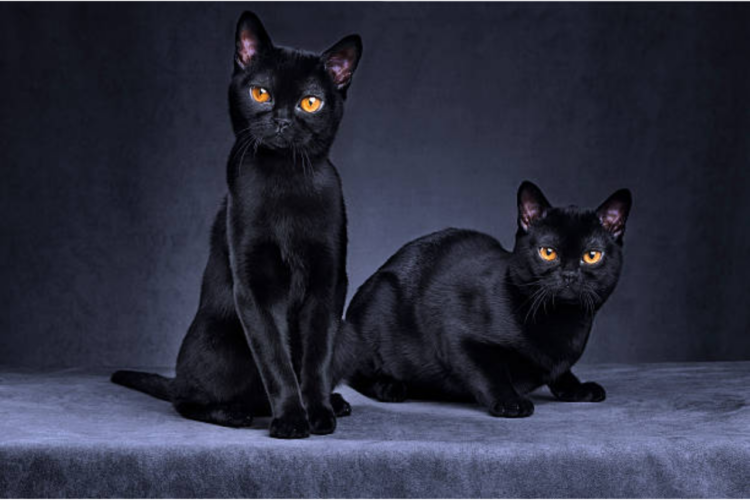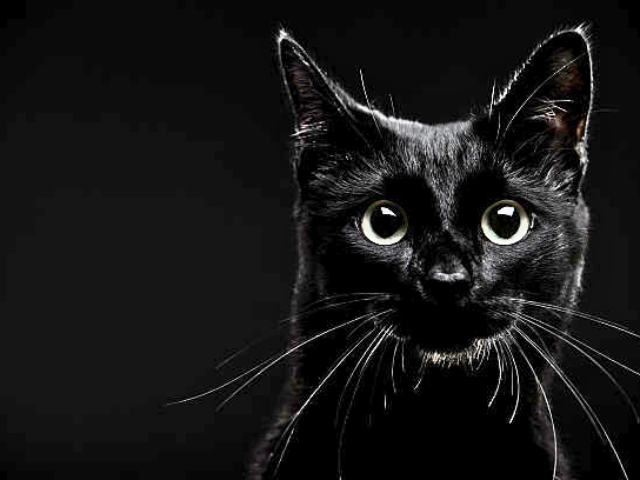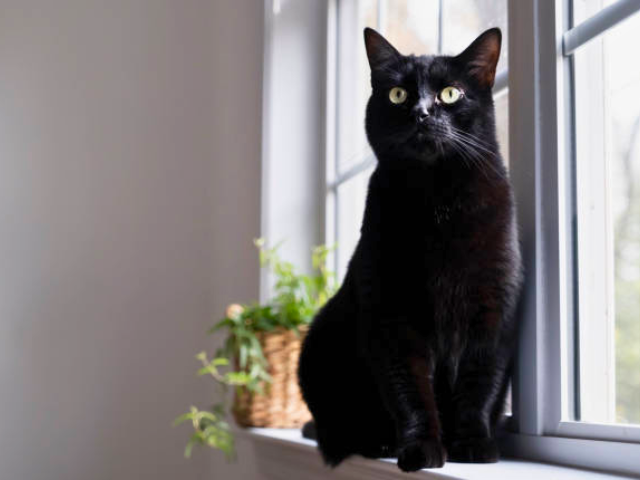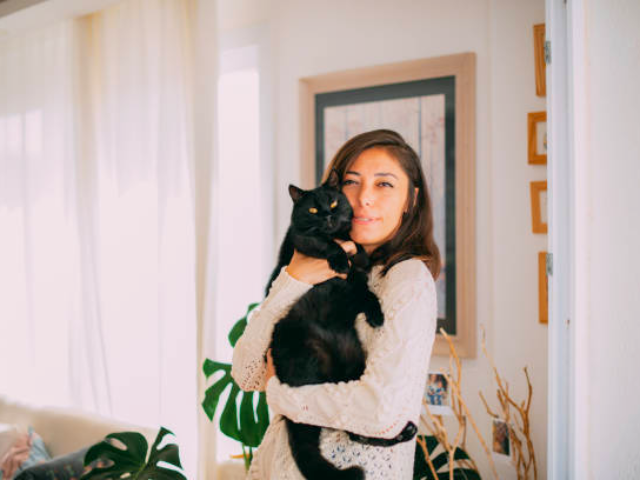
Are black cats more affectionate, or are they shy and mysterious? It’s a question that many people ask. Some believe black cats are cuddle champions, while others think it’s a myth. To answer this question, we will talk about black cat affection, including scientific research, folklore, and stories of black cat owners. By the end of this discussion, you’ll have a clearer picture of whether black cats are more affectionate than cats of other colors.

Cats show affection in different ways. Some purr and knead, while others follow their owners like shadows. Many factors influence this affectionate behavior. One is their breed. Some cat breeds, like Ragdolls and Maine Coons, are more loving to their owners.
Meanwhile, Siamese and Bengals are playful and energetic. But what about the fur color? Are black cats genetically more affectionate?
Research on feline genetics and behavior revealed that nature and nurture affect a cat’s temperament. While genetics can influence a cat’s personality, its environment and experiences impact its behavior. Some studies suggest that the color of their fur may also affect their personality traits. However, there’s no clear evidence that black cats are more affectionate because of their genetic makeup.
When it comes to their relationship with humans, early socialization plays a critical role. Like other cats of different colors, black cats benefit from positive interactions with humans during their early months. This early socialization helps them develop a strong bond with their owners. Thus, the perception that black cats are more loving relies on their upbringing rather than their coat color.
Some studies have also shown that some personality traits of black cats make them appear more affectionate companions. The reason could be the attention they get from cat lovers who don’t believe in superstitions surrounding their existence. The extra attention and care they receive make black cats more affectionate than others.

Many superstitions and myths have surrounded black cats for centuries. Some cultures believe that they only bring bad luck. In medieval Europe, black felines were associated with witchcraft and thought to have magical powers.
However, not all cultural perceptions of black cats see them negatively. In fact, voyagers would bring a black cat on their sail to ward off evil spirits. The ancient Egyptians also considered them sacred. They believed that caring for black cats would bring good fortune.
The same belief applies to the Japanese and Scottish. In Japan, people think good fortune is coming your way if you see a black cat on the street. Meanwhile, in Scotland, a black cat stepping on your doorstep will bring prosperity to the household.
These stereotypes and superstitions affect how people treat them. If a person believes that black cats are special and mysterious, they will treat them well. However, if someone thinks they will only bring bad luck, they won’t get the love and care they deserve.
These legends and myths have also affected the adoption rates of black cats. Some people don’t adopt them because of their negative beliefs. Those who considered giving them a loving home claim they are affectionate and loyal, challenging the telltales surrounding them.

Some interesting facts exist despite the beliefs and myths associated with black cats. Below are some fun facts that may surprise you:
Black Cats Can Resist Disease
Based on National Institutes of Health research in the early 2000s, the genetic makeup that gives a cat black fur may protect them from numerous diseases. Cats can acquire the same health issues as we do—HIV, cancer, and Alzheimer’s disease, to name a few. Thus, they are perfect models for studying human disease. Their genetic makeup helps researchers learn how to prevent these illnesses in humans.
Most Black Cats Are Male
The gene that gives them a black coat is on the X chromosome, which explains why most calico and tortoiseshell cats are female and solid black cats are male. Queen cats need two copies of the gene with a black coat color, while tomcats only need one. So, if you see a solid black cat, there’s a 75% chance it’s a male.
Black Cats Can Change Color
If your black cat loves basking in the sun (let’s be honest—what cat doesn’t?), the UV rays can degrade the pigment in their fur. As a result, it gives them a rusty color. But once it sheds its fur, its discolored coat will become black fur again.
Most Black Cats Have Yellow Eyes
While feline eye color comes in many shades, most black kitties have yellow or golden eyes. The striking contrast between the fur’s color and gaze adds mystique to their appearance.
They Can Have Long or Short Fur
Black cats aren’t exclusive to one breed. Some dark-coated felines have short fur, like the Bombay, the American Shorthair, and the Oriental Shorthair. Meanwhile, Persian, Maine Coon, and Siberian cats are long-haired cat breeds with black fur. There are even black, hairless cats, like the Sphynx!
Black Cats Have a Mild Personality
While there’s no solid proof regarding the connection between a cat’s fur color and personality, a survey from UC Berkeley suggests that black kitties have a mild temperament. They’re not overly affectionate or standoffish but intelligent and relaxed.
Fur Parents Refer to Their Black Cats as “Voids”
If you’ve tried to take a snapshot of an animal with a black coat, you may have noticed capturing its shape and details can be tricky. In pictures and low-light settings, black cats may appear as an astronomical black hole or a dimensionless shadow with a floating pair of yellow eyes. That’s why fur parents refer to their ebony fluffballs as “voids” that lurk around their home.
Black Cats Have a Special Day
While we believe every cat should be celebrated daily, black cats have a special day of the year. October 27, just four days before Halloween, we celebrate National Black Cat Day to dispel myths associated with the color of their fur.
They Have Hidden Patterns Underneath Their Black Fur
Looking closely at a solid black cat underneath the sunlight, you’ll see faint stripes within its coat. Most have tabby stripes hidden in their fur, which you can see in bright lights.
There’s an Exclusive Black Cat Café in Japan
It’s not an ordinary café where you can bring your furry companions and dine with them. At Café Nekobiyaka in Himeji, Japan, you can buy your favorite beverage and dessert and adopt a black cat from the shop! The adoptable cats wear a vibrant collar to identify them. Once a cat is adopted, another shelter black cat will take its place.

The best way to determine whether black cats are more affectionate is through their owners! We’ve talked to some black cat owners, claiming their pets are loving and loyal. They love cuddling sessions and being around their owners.
Social media confirms these experiences. If you visit and browse these platforms, you’ll see photos and stories about affectionate black cats. Many black cat owners share pictures of them with their cuddly pets sitting on their laps, purring, and giving headbutts.
But, of course, black cat owners don’t share the same experiences and sentiments. Some owners mentioned their black felines are independent, while others say their cats are reserved. It proves you cannot judge a cat’s personality based on color. Every cat is unique, just like us. Their personalities depend on their experiences and environments.

Vets, cat behaviorists, and shelter staff give us insights regarding black cat behavior. Their professional experiences provide a more objective perspective on whether black cats are more affectionate.
Veterinarians have observed that black cats aren’t more or less affectionate than cats of different colors. They said their loving behavior is due to good socialization and a caring and safe environment. Meanwhile, many cat behaviorists believe that the perception of black felines being more affectionate is due to how the media and pop culture depict them.
Shelter staff also report that black cats are often overlooked for adoption due to superstitious beliefs. But those who decided to give them a loving home said these felines are lovely pets. They’re more affectionate than cats of other colors.
These professional insights suggest what we’ve mentioned earlier—that every cat has a unique personality. While some black cats may display more affectionate behavior, their trait isn’t exclusive to their color. What’s more important is the bond between the cat and its owner.

Based on what we’ve learned, there’s no concrete evidence to prove that black cats are more affectionate. Their love for cuddles lies in their upbringing and experiences. Every cat has a unique personality. Some are cuddly and clingy, while others are aloof and independent. However, many black cat owners swear that their furry pals are the biggest cuddle bugs around—and who are we to judge and argue with that?
So, if you’re considering adopting a cat, don’t let its coat color be the deciding factor! Choose a feline based on its personality and how well you connect with it. What’s more important is finding a fluffy companion that will bring joy to your home—regardless of the color of its fur!


2 Responses
I’ve been a cat lover My whole life.I’ve always liked black cats.The last cat My Parents had,was a black cat,which I suspect was an American Shorthair,which as I understand,is not a lap cat,and ours wasn’t,and had the same type of build as the breed.It preferred to be with us than on us.Nonetheless,it was very affectionate.
I’ve been a fur mum to 4 cats altogether. 1 grey, long haired Persian, 1 white, long haired Maine Coon, 1 short haired Tom cat and 1 black, short haired kitten. The Persian and Maine Coon are gone. My Tom cat is 18 years old and still kicking. My kitten is 5 months old. ALL of them have been/are so affectionate! The love I’ve had with all of my babies is astronomical. My black kitten (whom I named Shadow…I only had my TV on and visibility was LOW. I couldn’t see her until she moved. I actually thought it was a shadow of my leaves from my floor plant!!), lies beside me all the time. I le on my side, she comes and lies on her side…facing each other. She puts her head on my pillow with me and then always stretches out her paw to cuddle my neck! She also gives me actual kisses! Not hygienic but c’mon…what animal lover could resist that?!? Lol.